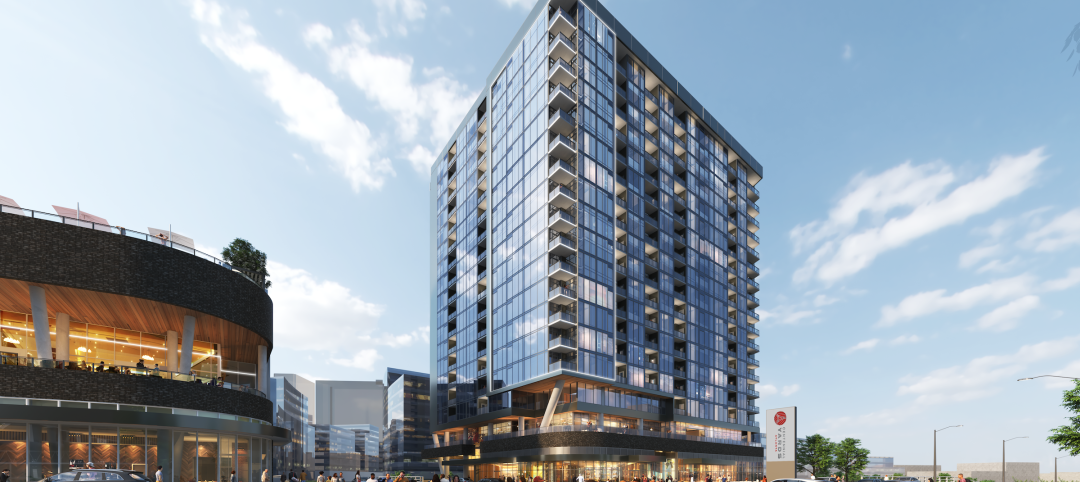The think tank New London Architecture (NLA) has released the results of an independent survey to uncover the number of towers planned for the capital and how this will affect the people who live and work in the city.
As part of a major NLA Insight Study into the past, present, and future of tall towers in the capital and NLA exhibition London’s Growing Up!, which opens next month, the survey by GL Hearn has found at least 236 tall buildings over 20 storys are currently proposed, approved, or under construction in London, and set to dramatically alter the capital’s skyline. Initial estimates had originally placed the figure at 200.
This new trend for tall buildings will see 33 buildings between 40 and 49 storys and 22 buildings of 50 storys or more planned for London.
About half (48%) of the 236 towers have been approved and 19% are already off the starting blocks and under construction.
High-rise living sees the biggest surge, with 80% of the towers planned as new residential blocks for the capital—a total of 189 new towers, potentially contributing to tackling London’s housing crisis.
Tower Hamlets, traditionally one of London’s less affluent boroughs, is at the heart of the building boom as the biggest area of development, with 23% of the projects being planned there alone.
Central and East London are the focus areas for the most future developments, with 77% of the total planned tall buildings. Tower Hamlets, Lambeth, Greenwich, Newham, and Southwark have a combined total of 140 new towers, out of the proposed 236.
Of the remaining towers, 18 are set to be office developments, eight hotels, 13 mixed-use, and one tower is earmarked as an educational institute.
The results of GL Hearn’s building survey will inform the NLA Insight Study which investigates the past, present, and future London skyline.
Status of tall building development projects
113 (48%) of development projects approved
72 (30%) proposed applications
45 (19%) under construction
6 (3%) unknown
Primary use of tall building development projects reviewed
189 (80%) of development projects have a primary residential use
18 (8%) of development projects have an primary office use
8 (3%) of development projects have a primary hotel use
Only 13 (6%) of development projects have a primary mixed-use
Only 1 (0.4%) of development projects have a primary University/Educational Institution use
Analysis of London's five sub-regions
East: 107 projects
Central: 76
South and North: 22 each
West: 10
About NLA — London’s Centre for the Built Environment
NLA was founded in 2005 to provide an independent information resource and a forum for discussion and debate about London’s built environment for professionals, public and politicians. Since that time it has successfully established itself as a major focus for discussion about architecture, planning, development and construction in the capital with a yearround program of events, publications and exhibitions, and a core mission – bringing people and ideas together to shape a better city.
About the London’s Growing Up! exhibition
London’s Growing Up! is a free exhibition and is on show at NLA’s galleries at The Building Centre, 26 Store Street, London WC1E 7BT from April 3 to June 12. Through the use of images, video, models, CGIs and visitor interaction, the exhibition will present a past, present and future view of London’s skyline as the capital’s developers focus on building upwards, rather than outwards.
Related Stories
Adaptive Reuse | Sep 12, 2024
White paper on office-to-residential conversions released by IAPMO
IAPMO has published a new white paper titled “Adaptive Reuse: Converting Offices to Multi-Residential Family,” a comprehensive analysis of addressing housing shortages through the conversion of office spaces into residential units.
Mixed-Use | Sep 10, 2024
Centennial Yards, a $5 billion mixed-use development in downtown Atlanta, tops out its first residential tower
Centennial Yards Company has topped out The Mitchell, the first residential tower of Centennial Yards, a $5 billion mixed-use development in downtown Atlanta. Construction of the apartment building is expected to be complete by the middle of next year, with first move-ins slated for summer 2025.
Healthcare Facilities | Sep 9, 2024
Exploring the cutting edge of neuroscience facility design
BWBR Communications Specialist Amanda Fisher shares the unique considerations and challenges of designing neuroscience facilities.
Office Buildings | Sep 6, 2024
Fact sheet outlines benefits, challenges of thermal energy storage for commercial buildings
A U.S. Dept. of Energy document discusses the benefits and challenges of thermal energy storage for commercial buildings. The document explains how the various types of thermal energy storage technologies work, where their installation is most beneficial, and some practical considerations around installations.
Office Buildings | Sep 5, 2024
Office space downsizing trend appears to be past peak
The office downsizing trend may be past its peak, according to a CBRE survey of 225 companies with offices in the U.S., Canada, and Latin America. Just 37% of companies plan to shrink their office space this year compared to 57% last year, the survey found.
University Buildings | Sep 4, 2024
UC San Diego’s new Multidisciplinary Life Sciences Building will support research and teaching in both health and biological sciences
The University of California San Diego has approved plans for a new Multidisciplinary Life Sciences Building, with construction starting this fall. The 200,000-sf, six-level facility will be the first building on the UC San Diego campus to bridge health science research with biological science research and teaching.
Codes and Standards | Sep 3, 2024
Atlanta aims to crack down on blighted properties with new tax
A new Atlanta law is intended to crack down on absentee landlords including commercial property owners and clean up neglected properties. The “Blight Tax” allows city officials to put levies on blighted property owners up to 25 times higher than current millage rates.
Resiliency | Sep 3, 2024
Phius introduces retrofit standard for more resilient buildings
Phius recently released, REVIVE 2024, a retrofit standard for more resilient buildings. The standard focuses on resilience against grid outages by ensuring structures remain habitable for at least a week during extreme weather events.
Construction Costs | Sep 2, 2024
Construction material decreases level out, but some increases are expected to continue for the balance Q3 2024
The Q3 2024 Quarterly Construction Insights Report from Gordian examines the numerous variables that influence material pricing, including geography, global events and commodity volatility. Gordian and subject matter experts examine fluctuations in costs, their likely causes, and offer predictions about where pricing is likely to go from here. Here is a sampling of the report’s contents.
Adaptive Reuse | Aug 29, 2024
More than 1.2 billion sf of office space have strong potential for residential conversion
More than 1.2 billion sf of U.S. office space—14.8% of the nation’s total—have strong potential for conversion to residential use, according to real estate software and services firm Yardi. Yardi’s new Conversion Feasibility Index scores office buildings on their suitability for multifamily conversion.

















